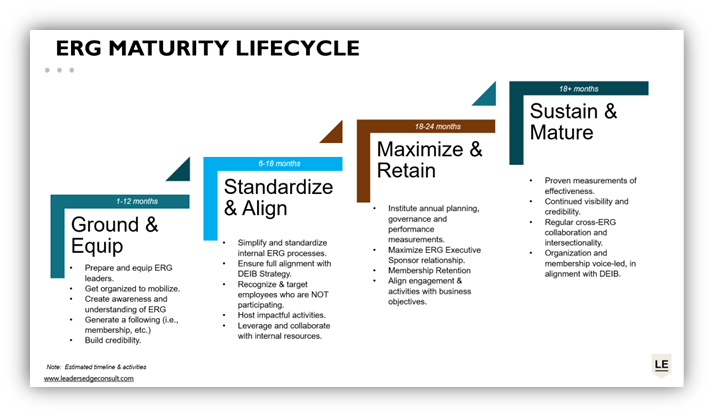BY ENERGY WORKFORCE ENGAGEMENT COMMITTEE MEMBER SHANTA EADEN, LEADER’S EDGE CONSULTING
The positive impact on company culture from Employee Resource Groups (ERGs) is often underestimated. But there is a reason why 90% of Fortune 500 companies have ERGs. ERGs (also known as affinity groups or business network groups) are groups of employees who join in their workplace based on shared characteristics or life experiences. Every day when your employees come to the office (or login) for work, what’s their experience? Do they feel valued, included, as though they belong? In the era of a war for talent, not only do we need to attract top talent, but we also need to retain them.
For this reason, an organization’s Diversity, Equity, Inclusion and Belonging (DEIB) strategy typically includes Employee Resource Groups. Aligning ERGs with the overarching DEIB strategy ensures these groups effectively contribute to the company’s goals, values and mission.
ERGs are a strong lever to enrich culture and enable inclusion. They do this by:
- Creating community and connection. Facilitating meaningful connections among employees who share common backgrounds, experiences and interests.
- Provide a platform for skill-sharing, mentorship and professional development. Deloitte reported that 71% of millennials believe their leadership skills are not being fully developed. ERGs contribute to employee career growth and engagement.
- ERGs help acknowledge and celebrate diversity and diverse contributions, enhancing the sense of recognition and appreciation among employees. BCG revealed that diverse teams generate 19% higher innovation revenues.
- ERGs enhance a company’s attractiveness for talent, contributing to improving recruitment and retention rates. Glassdoor reported that 67% of job seekers consider workforce diversity a key factor when evaluating potential employers.
These outcomes don’t exist immediately; there is a journey of maturity that ERGs must progress through to be sustainable structures within an organization, enabling business outcomes. To start, strong executive support is foundational, and there are various steps and considerations at each level.

Since employee engagement, retention and inclusion are critical to the organizational culture — and ERGs are employee-led — ERG leaders are also culture carriers. Organizations want these leaders to be well-supported and equipped to perform their roles effectively. They may or may not be people-leaders in their ‘day’ jobs, and even if they are, leading ERGs are different. You must lead through influence, have the ability to execute and be agile, making the connection between employee engagement and business alignment. This takes effort and intention to equip and support their ERG leaders properly.
Organizations can support their ERG leaders by:
- Providing valuable tools, knowledge and insights to enhance their leadership abilities.
- Orchestrating best practice sharing and insights from peers across industries to discover strategies for driving successful ERG initiatives, promoting cultural competence, and enhancing members’ professional development.
- Educating and empowering ERG leaders to be DEIB Champions so they are equipped to inspire and lead by example, cultivating inclusion and championing diversity initiatives.
- Developing their leadership skills to engage and sustain senior leadership support, enabling them to align ERG initiatives with the organization’s overall objectives.
Organizations shouldn’t embark on this journey alone. Even fully staffed DEIB teams need additional support as they pull the lever of ERGs to drive culture. There is no one size fits all. There are several factors, including current culture, location, employee interests, structure, processes, business objectives, etc.
In September, Leader’s Edge will host its inaugural cross-industry ERG Leadership Symposium for ERG leaders and DEIB Leaders/Champions. It will be a professional development experience, with intentional networking and peer exchange, leadership development, executive coaching circles and a wellness moment.
Also, don’t forget to register for Energy Workforce’s upcoming People & Culture seminar including topics on succession planning, pay equity & balancing DEI goals in a global organization.
ENERGY WORKFORCE ENGAGEMENT COMMITTEE MEMBER
Shanta Eaden, Founder and CEO, Leader’s Edge Consulting

Shanta is an enterprise change leader with 20+ years of expertise in integrating people, processes and technology to affect change. She has led multinational teams in the Finance and Energy sectors. As a recognized DEI strategist, change leader and project management executive, she emphasizes trusted partnerships. She leverages her uniquely positioned background to close the gap between strategy and execution to impact organizational culture. Shanta is a sought-after DEI speaker, panelist, certified professional and inclusive behavior coach, and business consultant. She holds a bachelor’s degree in business administration from Texas Southern University and an MBA from LeTourneau University, with concentrations in Management and Human Resources.




